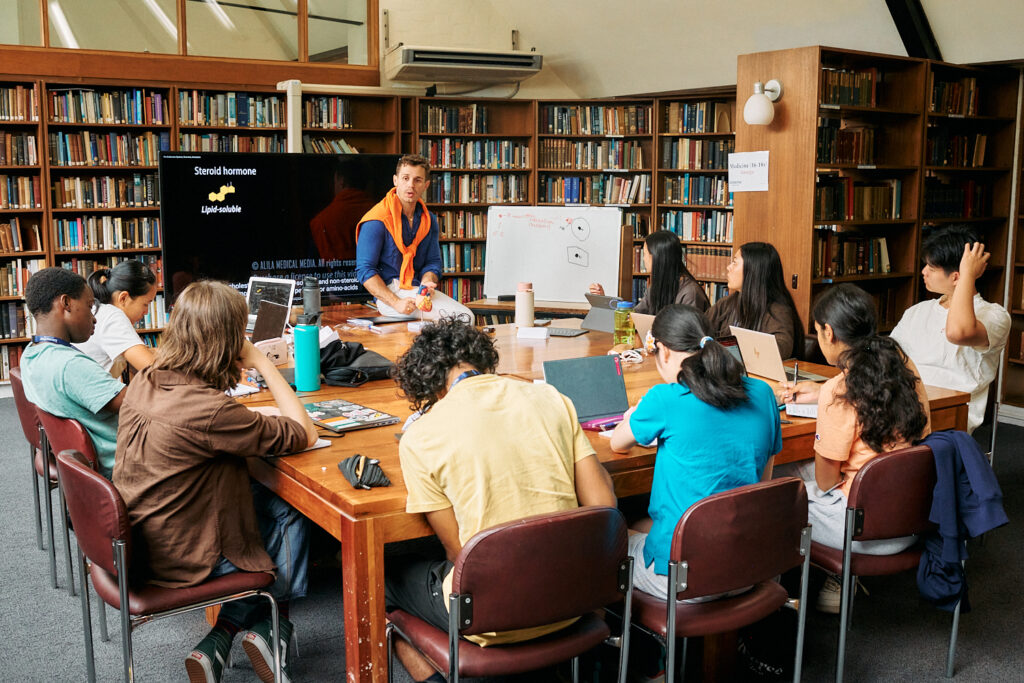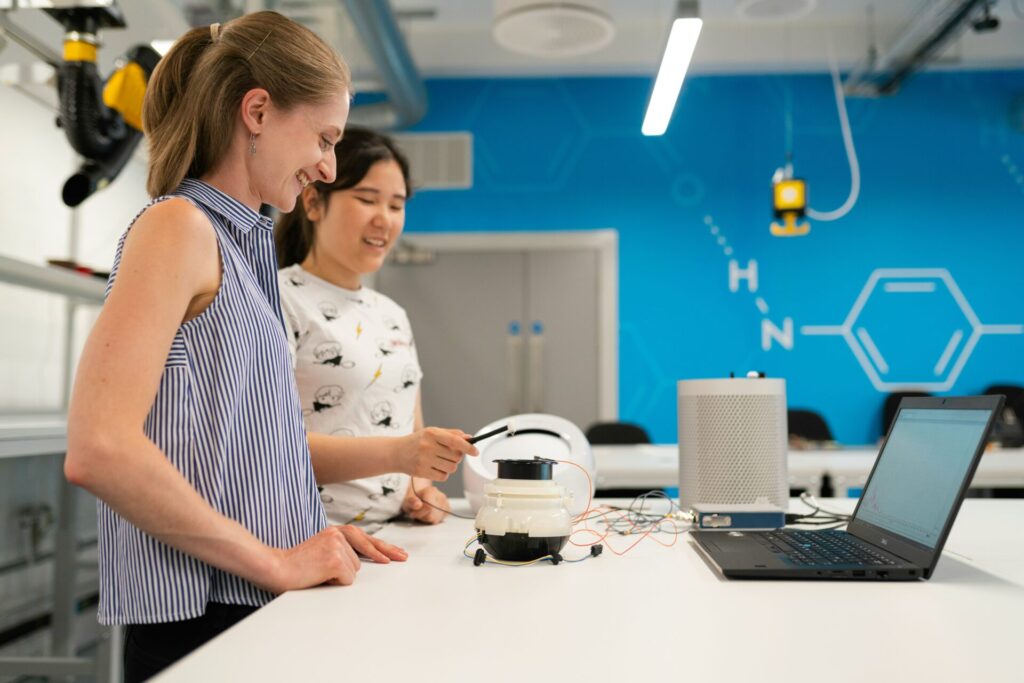These days, the digital landscape shapes the way we live, work, and connect. The traditional ways to gain work experience are undergoing a transformation as a result, with virtual work experience proving an increasingly popular option.
Remote work is increasingly common, with only 20% of remote-capable employees now working in person full-time. It makes sense that work experience is moving online, too. If you have your sights set on certain industries, remote work experience can be a viable way to take steps toward your future before you decide to partake in-person.
No matter if you decide to do work experience in-person or online, its importance in your university application is fundamental and can help make your application stand out from the crowd.
Read our article: How to add work experience in your personal statement
In this article, we’ll delve into remote work experience, what it is, its benefits and how to find it.
What Is Virtual Work Experience?
Work experience involves taking an unpaid placement at a company to gain some insight into the world of work. Virtual work experience is similar, except you participate remotely via the Internet.
In the UK, you get two opportunities to do work experience during your studies: once in Year 10 and once in Year 12. These are short-term placements usually lasting a week. It is now possible for students to do virtual work experience during these weeks. However, you can also take the initiative to gain work experience during the holidays, setting you up for your future.
Virtual work experience goes by many names: virtual internships, remote work experience, and online work experience. All you need is a laptop or computer with internet access, and you can participate in one of these opportunities.
Whatever role you choose, remote work experience can teach you some great skills, including remote collaboration, online learning, and how to work on digital projects.
What Does Virtual Work Experience Involve?
Online internships vary depending on the role you do and the company you work for. Generally, you will be assigned a point of contact, someone in the company who will mentor you and help you with your tasks.
Here’s what your day-to-day might look like:
- Regular meetings with your mentor.
- Individual project work, focusing on a larger project instead of helping with small jobs as you would in an office.
- Video tutorials.
- Training opportunities via an e-learning platform.
- Online socialising events like coffee breaks.
- Virtual networking sessions and online meetings with different colleagues.
Networking as a virtual intern can be hard, but it’s important to try and get to know people in the company, even from afar. That way, you can gain an insight into different perspectives throughout the company.

Benefits of Virtual Work Experience
Whether you choose an in-person or virtual work experience opportunity is up to you. To help you make the decision, here are some of the tangible benefits of virtual work experience.
1. Cost
Completing online work experience can be highly cost-effective. Depending on the industry you want to work in, you may need to relocate for in-person work experience. To do so, you need to pay for accommodation, transport, and additional fees while you’re there. Even if you work in your city, commuting can cost money.
Online work experience programs are more cost-effective. There’s no need to spend money on accommodation or commuting, because you can work from home.
2. Accessibility
Virtual work experience can be more accessible than in-person opportunities. This is partially due to the reduced cost, which means students with financial constraints can still participate.
Alongside overcoming financial barriers, students can overcome regional and health barriers, too. For example, you don’t have to live in or near London to get a great work experience placement with a multinational company because you can do it online. Students from all over the world can enrol in top programmes, giving them the experience they need.
In terms of health, being able to work from home is ideal for disabled students who might struggle to get around. It’s even beneficial for those who still feel anxious about the increased risk of COVID-19 that comes from in-person work placements.
This increased accessibility means that your options for work experience are vast. Plus, they’re flexible, meaning you can fit a placement more easily around your studies and other commitments.
3. Building Digital Skills
In the modern workplace, remote working is an important skill. A virtual work experience placement can teach you how to stay focused, connect with colleagues and work independently from afar. Having these skills can look great on your CV.
What’s more, you’ll learn how to use digital technologies that are crucial for many jobs. Whether it’s getting to grips with communication and presentation software or learning how to effectively use spreadsheets and co-working documents, these are all skills that appeal to future employers.
4. Structured Learning
In-person work placements often involve doing menial tasks and helping out. While you still learn a lot, virtual work experience can provide a more structured approach to learning.
Often, through your mentor, you’ll learn more about working in a set role, and you might even get to work on a real project. For example, a business programme can teach you market analysis, financial modelling, and strategic planning.
As a result, you can garner industry-specific knowledge alongside critical thinking skills and soft skills.
5. Hands-on Learning
Working on projects also gives you hands-on, practical experience in your chosen industry. For example, you can participate in engeering programmes that give you hands-on experience in project management.
When it comes time to write your university personal statement or apply for a job, you’ll have real-world experience of working on a project. This can also help you out in interviews because you can draw on your experience. Employers will value the fact that you can bring something tangible to the role, giving you an advantage in a competitive space.
6. Global Networking Opportunities
With virtual work experience, you can join multinational programmes and meet learners like you from around the world. What’s more, you can network with amazing experts and professionals in your chosen field, giving you a chance to network with people around the globe.
7. Enhancing Employability
All work experience placements can help you learn valuable transferable skills, including organisation, time management and prioritising, communication, and teamwork. Virtual work experience can teach you even more soft skills, including self-motivation and independent work without a physically present supervisor.
Plus, as we’ve mentioned above, virtual work experience can help you gain practical insights into the field. If you master the art of networking, you can get your foot in the door in your chosen industry.
8. Personalised Guidance
Many virtual work experience opportunities offer personalised support via a mentor. As a result, you get a solid point of contact to guide you every step of the way and provide helpful feedback. Plus, this gives you a solid connection with an expert in the industry who might be able to help you on your career path later down the line.
9. Showcasing Initiative and Proactivity
Since work experience is highly encouraged in the UK, having a placement alone doesn’t always stand out on a CV. However, putting in the effort to pursue your chosen field through a competitive virtual internship shows how proactive you are.
A virtual work experience opportunity is a chance to showcase initiative. It can make you stand out when it comes time to enter the workforce.
Join the Immerse Education 2025 Essay Competition
Follow the instructions to write and submit your best essay for a chance to be awarded a 100% scholarship.

Where to Find Virtual Work Experience
These days, many UK employers offer virtual work experience. This includes small and medium enterprises (SMEs) and multinational corporations, which means you aren’t short on options. These remote placements are available across numerous sectors, including:
- Accounting and banking
- Banking and consultancy
- Engineering
- Healthcare
- IT
- Insurance
- Law
- Marketing
- Media
- Retail
Some large names offer virtual work experience, including Deloitte, EY, JP Morgan, KPMG, Springpod, Pfizer, and others.
If you’re considering a virtual work experience placement, make sure you do thorough research to find a role that suits you. If you have your heart set on a particular company, you can check if they offer virtual work experience through their website.

Navigating Virtual Internships
Although virtual work experience has many benefits, there are also some drawbacks. This includes:
- You don’t get any experience in an office or workplace environment. Your first time in the workplace can be overwhelming, but with virtual work experience, you get to stay within your comfort zone to a certain extent. As a result, you’re less exposed to the real workplace.
- It can be difficult to stay motivated, especially if you struggle with self-discipline.
- Networking can be a challenge. You need to maintain the confidence to follow up with online connections and ask them questions even though you haven’t met them in person.
- Communicating online can be a challenge, and it often hinges on how good the organisation is at staying in touch. On the flip side, you’ll learn a lot about remote communication
- There’s a risk of being duped by non-existent virtual internships and false opportunities. Make sure you do your research to avoid this.
If you can master techniques like online communication etiquette and staying organised with colleagues despite time zone differences, you’ll learn a lot during your virtual internship. So, despite these drawbacks, it can still be an extremely valuable and rewarding experience.
How to Get the Most Out of Virtual Work Experience
Given the challenges you may face during remote work experience, it’s important that you know how to make the most of it. Here are some top tips:
- Set some goals for yourself so you’re clear on what you want to gain from the process. This might be to practice networking or to learn a particular skill.
- Set clear boundaries, with clear office hours even if your work schedule is flexible. Designate a place to work that’s free from distractions.
- Turn up on time, even though you’re working from home, and make sure you’re ready to work.
- If you’re doing video calls, dress smartly and ensure your background is tidy and noise is minimal.
- Reduce distractions by putting your phone on silent.
- Be polite and professional with everybody you encounter.
- Make notes as you go. This includes noting down the things you have done–you might forget that all your tasks are accomplishments worth remembering!
- Don’t be afraid to ask questions and join in with any meetings and social events.
- Ask for feedback.
Just like any other form of work experience, an online internship can make you feel nervous. However, if you commit to making the most of it, you’ll learn a lot. Not only will it help you appear more attractive to universities and employers, but it will also help you feel more confident when you enter the workplace (virtual or in person) for real.
Kickstart Your Career with Work Experience
Virtual work experience has allowed many students to partake in and gain industry insights from companies around the world. As remote work becomes more prevalent, these opportunities are set to stick around.
When searching for work experience opportunities, you can choose to do in-person summer programme placements or virtual programmes. It’s a good idea to keep an open mind when trying to find a placement; research the best opportunities in your chosen field and try to find one that suits you. It’s a good idea to apply early, especially because placements can be competitive.
Read our article: Work experience ideas for year 12
Students with an interest in engineering, medicine, business, and law can benefit from the Immerse Education In-person Career Insights programmes – industry and work experience-led sessions that see participants receive close mentorship from people in their desired field, and work on real projects for industry experience.

























